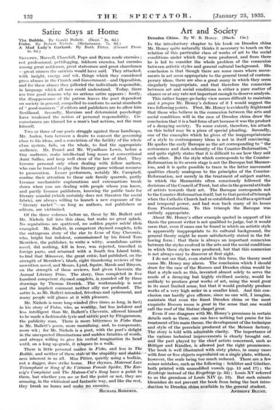Satire Stays at Home
SKELTON, Marvell, Churchill, Pope and Byron made enemies ; not professional, pettifogging, inkhorn enemies, but enemies among great noblemen, great statesmen and great churchmen —great sinners the satirists would have said. They attacked,
with insight, energy and wit, things which they considered gross abuses in the Church and Government—and Opposition, and for these abuses they pilloried the individuals responsible, in language which all men could understand. Today, there are two good reasons why no serious satire appears : firstly, the disappearance of the patron leaves the poet dependent on society in general, compelled to conform to social standards of " good-manners " if editors and publishers are to allow him livelihood. Secondly, Marxism and determinist psychology have weakened the notion of personal responsibility. Cir- cumstances are blamed for a man's bad actions, not the man himself.
Two or three of our poets struggle against these handicaps. Mr. Auden, torn between a desire to convert the governing class to his ideas, and a conviction of the futility of the whole class system, fails, on the whole, to find the appropriate audience. Mr. Pound and Mr. Wyndham Lewis, before a tiny audience, make intellectual long noses at conventional Aunt Sallies, and keep well clear of the law of libel. They- become personal only when dealing with fellow authors, who can be trusted to play the literary game without recourse to prosecution. Lesser performers, notably Mr. Campbell, confine their attention to these safe family quarrels, partly because mechanistic explanations and extenuations break down when you are dealing with people whom you know, and partly because publishers, knowing the public taste for literary scandal (which certainly does not threaten the social fabric), are always willing to launch a new exposure of the " literary racket "—as long as authors, not publishers or editors, are victimized.
Of the three volumes before us, those by Mr. Bullett and
Mr. Nichols fall into this class, but make no great splash. No reputations are spattered, no sodden papier mdche idols
crumpled. Mr. Bullett, in competent rhymed couplets, tells the outrageous story of the rise to fame of Guy Chevenix, who, bright but indolent, commissioned by his friend Tom Merridew, the publisher, to write a witty, scandalous satiric novel, did nothing, fell in love, was rejected, travelled in foreign parts, and returned with a South Sea Island bride, to find that Minoover, the great critic, had published, on the strength of Merridew's blurb, eight thundering reviews of the unwritten novel, and Messrs. Lynd, Squire, Marsh and Binyon, on the strength of these reviews, had given Chevenix the Annual Literary Prize. The story, thus completed in five hundred competent rhymed couplets, _is rounded off by three drawings by Thomas Derrick. ..The workmanship is neat and the implicit comment neither silly nor profound. The satire is, as Mr. Bullett intended, frivolous and ephemeral, and many people will glance at it with pleasure.
Mr. Nichols is more long-winded (five times as long, in fact) in his story of Fisbo, who, as wealthy, but less indolent and
less intelligent than Mr. Bullett's Chevenix, allowed himself to be made a fashionable lyric and satiric poet by Fitzgammon, the publicity man. There_ is more bitterness in Fisbo than in Mr. Bullett's poem, more moralizing, and, to compensate, more wit ; for Mr. Nichols is a poet, with the poet's delight
in the unexpected illuminationi and sudden fatuities of words, and always willing to give his verbal imagination its head until, on a long up-grade, it relapses to a walk. _
There is little personal malice in Fisbo, and less in The Bubble, and neither of them stithIft?the Ittipidity -and- shabbi- ness inherent in us all. Miss Pitter, quietly using a bodkin, not a dagger, does strike home. Her rhymes, Maternal Love Triumphant or Song of the Virtuous Female Spider, The Ear- wig's Complaint and The Matron-Cats Song have a point to them, but whether you see or feel the point or not, they are
amusing, in the whimsical and fantastic way, and like the rest, they break no bones and make no enemies. , -














































 Previous page
Previous page